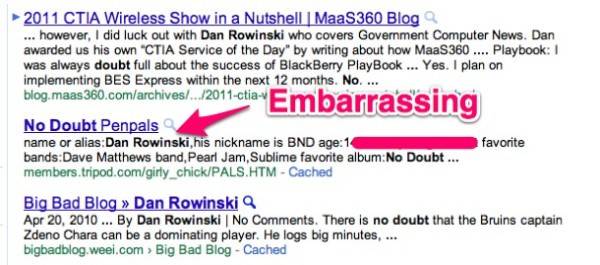Do you have an embarrassing moment in your past? Did it turn out to be newsworthy? There is a good chance it made it to the Internet and now is forever searchable by Google and the other search engines.

Google is being hit with a “Right To Forget” lawsuit in Spain as the country’s Data Protection Agency has ordered the Web giant to take down search links on 90 people. According to The Associated Press, Google is fighting five of those lawsuits in Spain’s National Court and in January refused Spain’s request on all 90 of the claims.
Almost everybody has something on the Internet that they would rather people not see. For example, I would love if a message board post I did in the band No Doubt’s forum when I was a teenager could be stricken from the record. No such luck. Search technology has lowered the bar for obtaining information on people on the Internet. In the Spain suit, the AP gives the example of a plastic surgeon, Hugo Guidotti, where the first search result is an example of his work but the second is of a lawsuit from 1991 accusing him of surgery that went bad (Guidotti was acquitted).

The European Union has introduced legislation to protect Internet users’ data online that would also allow for the right to be forgotten, according The Telegraph.
In the EU law, individuals would have to opt-in for companies to use their data. That could mean companies like Google could not use their information in search results unless permission is expressly given. The United States has introduced legislation recently that would follow the EU lead in privacy such as the National Strategy for Trusted Identities in CyberSpace and the Commercial Data Bill Of Rights.
See also:
FTC Charges Google with “Deceptive Privacy Practices” in Buzz Rollout
Google has argued that erasing personal search results would compromise the integrity and objectivity of its search results. The point is fair. There are historical influences to be considered when talking about search results.
For instance, a lot of American history scholars use old broadsides, pamphlets, published letters and news articles to decipher and uncover pertinent historical data that helps us better understand our history. In the current era of technology the equivalent of such data are searchable news records, blog posts, tweets and more. In many ways, Google is the first line of historical preservation.
On the other hand, search can be skewed and manipulated by parties with an agenda. For instance, during the recent 2010 mid-term elections political activists used SEO tactics to raise the search rankings of embarrassing articles of political opponents. Businesses have used similar tactics when a competitor makes a gaffe, a sort of proxy war marketing technique. Granted, politicians and businesses are not private citizens but the same power for abuse still exists.

















